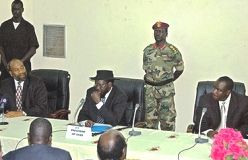Uganda’s negotiations open, rebels talk taugh
July 14, 2006 (JUBA) — Uganda’s rebel Lord’s Resistance Army (LRA) vowed to continue its brutal two-decade war unless its grievances are addressed, as delayed peace talks with the government opened in southern Sudan.
 The rebels delivered the blunt warning even as they professed commitment to a peaceful settlement of the group’s 19-year war in northern Uganda, which has killed tens of thousands and displaced nearly two million others.
The rebels delivered the blunt warning even as they professed commitment to a peaceful settlement of the group’s 19-year war in northern Uganda, which has killed tens of thousands and displaced nearly two million others.
“The time has come for the truth to be told,” rebel spokesman Obonyo Oweni told the opening ceremony of the negotiations being mediated by the autonomous government of southern Sudan at its parliament in the regional capital.
“My delegation wishes to send a strong message that unless a comprehensive approach to peace is found, it may be too late for the region,” he said. “Uganda has suffered and continued to suffer.
“Innocent blood has been spilled, the principles of democracy and good governance have been sacrificed for the aggrandisement of a few,” Oweni said in a direct verbal assault on the government in Kampala.
“Our message to the Ugandan government is ‘sitting down for peace does not mean the LRA are weak militarily.’ No, we are not,” Oweni said.
“If Uganda believes they can settle this on the battlefield, they are in for a rude shock,” he said in comments that took some observers by surprise given the conciliatory nature of the Ugandan government team’s earlier statement.
“They were a little bit harsh, weren’t they,” a senior Sudanese mediator told AFP after the ceremony.
In his comments, the head of Kampala’s delegation, Interior Minister Ruhakana Rugunda, said the government was ready to resolve the conflict quickly.
“Together, we can look for and find a lasting solution to this conflict,” he said. “My delegation is committed to ensuring that these problems can come to a very speedy end.”
The ceremony began with a call from Sudanese Vice President Salva Kiir for the two sides to use the historic opportunity to end the bloody conflict.
“I want both delegations to approach these talks with open minds,” said Kiir, who is also the president of southern Sudan. “Let the world see that now you are doing the right thing.”
The negotiations, to continue on Saturday, had been due to start on Wednesday. But they were delayed while chief mediator Riek Machar, the vice president of southern Sudan, sought to convince the LRA rebels to send its top leaders.
Uganda had wanted elusive rebel supremo Joseph Kony, his deputy, Vincent Otti, or one of three other LRA commanders to attend the Juba talks, on the grounds that only the most senior leaders had the power to negotiate on the LRA’s behalf.
But on Wednesday, the rebels rebuffed the appeal, with Otti telling Machar it was too dangerous for the senior leadership to participate. This was mainly because the International Criminal Court (ICC) has issued international arrest warrants for the five leaders on charges of war crimes.
Ugandan President Yoweri Museveni has offered Kony and the others “total amnesty” should the peace talks produce a settlement but the ICC says the war crimes charges and arrest warrants remain in force.
Rugunda said Museveni’s position was proof of Kampala’s good will.
“The fact that President Museveni has granted amnesty clearly demonstrates that Uganda is moving an extra mile to ensure peace is attained in our region,” he said.
Rugunda and the leader of the LRA team, Martin Ojul, then shook hands.
Tens of thousands of people have been killed and some two million displaced in northern Uganda since the LRA took leadership of a regional rebellion among the Acholi ethnic minority in 1988, in a bid to oust Museveni.
Kony, a self-proclaimed prophet and mystic who claims to speak directly to God, purports to be fighting to replace Museveni’s government with one based on the Biblical 10 Commandments.
But the LRA has become better known for atrocities, particularly the kidnapping of an estimated 25,000 children — girls for sex slaves and boys for fighters.
The United Nations and relief agencies describe the conflict as one of the world’s worst humanitarian crises.
Numerous previous attempts to negotiate a peace deal have failed, with both sides accusing the other of sabotage.
(ST)
